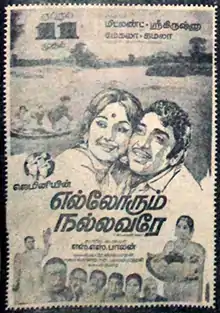Ellorum Nallavare
Ellorum Nallavare (transl. All people are good) is a 1975 Indian Tamil-language film, directed and produced by S. S. Balan. It is a remake of the 1974 Kannada film Bhootayyana Maga Ayyu.[1] It was simultaneously produced in Telugu and Hindi languages as Andaroo Manchivare (transl. Everyone is good) and Ek Gaon Ki Kahani (transl. The story of a village). The trilingual was the last production of Gemini Studios; except for the Telugu version, it emerged a box-office bomb and led to the studio's collapse.
| Ellorum Nallavare | |
|---|---|
 Theatrical release poster | |
| Directed by | S. S. Balan |
| Story by | Gorur Ramasawamy Iyengar |
| Produced by | S. S. Balan |
| Starring | R. Muthuraman Manjula Vijayakumar Jayanthi |
| Music by | V. Kumar |
Production company | |
Release date | 11 April 1975 |
| Country | India |
| Languages |
|
Plot
The story line includes characters like a greedy moneylender and his repentant son, a good Samaritan, who is a victim of the unscrupulous moneylender, his son, the enmity that springs up, romance thrown in for good measure, the fury unleashed by a remorseless nature, and the terrible wages that evil earns.
Production
Ellorum Nallavare was produced and directed by S. S. Balan.[2][3] It was the final film produced under the Gemini Studios banner.[4][5] It was a trilingual,[6] produced in Tamil, Telugu and Hindi languages.[7] The Telugu version was titled Andaroo Manchivare,[8] and the Hindi version was titled Ek Gaon Ki Kahani.[9] The film was entirely shot at Kalasapura village, they built house sets there specifically for the film.[1]
Soundtrack
The soundtrack was composed by V. Kumar.[10][11]
| Song | Singer(s) | Lyrics |
|---|---|---|
| "Sivappukkal" | T. M. Soundararajan, P. Susheela | Pulamaipithan |
| "Padaithaane Bramma Devan" | S. P. Balasubramaniyan | Pulamaipithan |
| "Yamma Kannu" | S. P. Balasubramaniyan | Pulamaipithan |
| "Pagai Konda Ullam" | K. J. Yesudas | Pulamaipithan |
Reception
Ellorum Nallavare was a box-office bomb,[2][12] and led to the collapse of Gemini Studios.[6] Ek Gaon Ki Kahani too did not succeed, but the Telugu version did.[13] Kanthan of Kalki appreciated the performances of the cast and crew particularly appreciating cinematography for the flood scene and concluded that the film's producer and director S. S. Balan reminds of S. S. Vasan and called it an exciting colour film.[1]
References
- காந்தன் (27 April 1975). "எல்லோரும் நல்லவரே". Kalki (in Tamil). p. 39. Archived from the original on 28 February 2023. Retrieved 28 February 2023.
- Rajadhyaksha & Willemen 1998, p. 99.
- Rajadhyaksha & Willemen 1998, p. 594.
- "தேவரை தியேட்டருக்கு வரவழைத்த வாசன்! ( தமிழ்சினிமா முன்னோடிகள்: தொடர் -14)". Ananda Vikatan (in Tamil). 2 November 2015. Archived from the original on 28 February 2023. Retrieved 27 February 2018.
- Pillai, Swarnavel Eswaran (2015). Madras Studios: Narrative, Genre and Ideology in Tamil Cinema. India: Sage Publications. p. 100. ISBN 978-93-5150-212-8.
- Ashokamitran (2016). Fourteen Years with Boss. Penguin Books. p. 161. ISBN 978-0-14-342329-4.
- Vaidiyanathan, K. (23 December 2014). "S S Balan was the doyen of Tamil journalism". Exchange4media. Archived from the original on 20 March 2018. Retrieved 20 March 2018.
- Bhaskar, Vijaya (14 January 2006). "1975 – The mother of all years". Idlebrain. Archived from the original on 20 October 2018. Retrieved 19 October 2018.
- "EK GAON KI KAHANI (1975)". British Film Institute. Archived from the original on 13 April 2018. Retrieved 13 April 2018.
- "Ellorum Nallavare". Saregama. Archived from the original on 28 February 2018. Retrieved 27 February 2018.
- "BOLLYWOOD INDIAN Ellorum Nallavare P. SUSHEELA Sounderarajan 7" 45 RPM EMI Columbia EP 1975". ecrater. Archived from the original on 11 November 2022. Retrieved 11 November 2022.
- Raj, Michael (19 December 2017). "விகடன் எம்.டி பாலசுப்ரமணியம் காலமான தினமின்று ..." Nellai Times Now (in Tamil). Archived from the original on 13 April 2018. Retrieved 13 April 2018.
- Kandavel, Sangeetha (24 November 2011). "Tamil director Gautham Vasudev Menon making India's first trilingual film". The Economic Times. Archived from the original on 19 October 2018. Retrieved 19 October 2018.
Bibliography
- Rajadhyaksha, Ashish; Willemen, Paul (1998) [1994]. Encyclopaedia of Indian Cinema. British Film Institute and Oxford University Press. ISBN 0-19-563579-5.